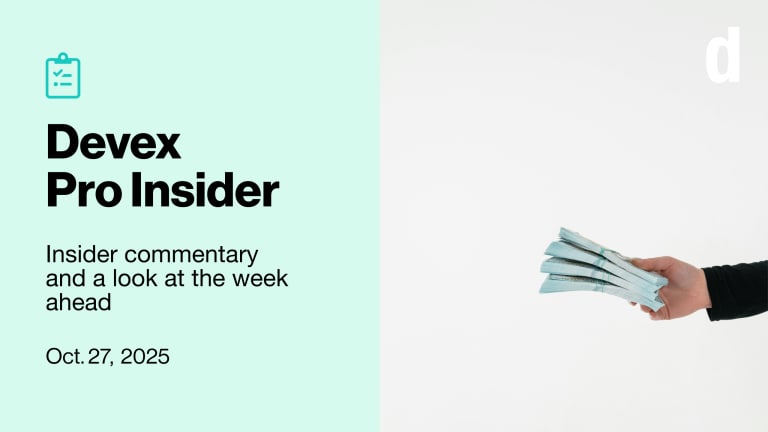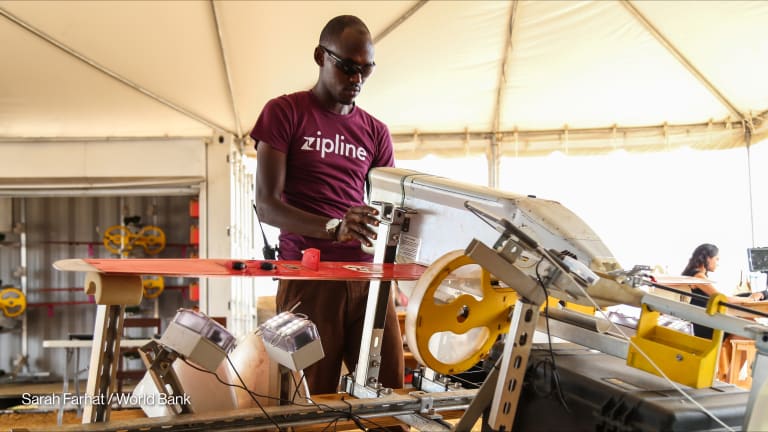
BRUSSELS — France will start a Fund for Innovation in Development next year to test and scale up solutions to poverty and inequality, a move its founders hope will “transform” the country’s approach to aid.
The Fonds d’Innovation pour le Développement, or FID, chaired by MIT economist and Nobel laureate Esther Duflo, will be an independent body hosted by the French Development Agency in Paris. For its first year, the French ministries of finance and foreign affairs will contribute a combined €15 million ($18.3 million), though French Member of Parliament Hervé Berville told Devex that the annual amount will likely increase.
For Pro subscribers: Esther Duflo: Foreign aid at risk of becoming 'irrelevant'
The Nobel prize winner says health ministers from low-income states negotiating grants with junior bureaucrats from Western donors "makes no sense."
“You don’t start in the first year with €100 million, because you need to build your pipeline,” said Berville, a deputy from President Emmanuel Macron’s La République en Marche party who proposed the fund in his 2018 report on modernizing French aid. Berville said discussions are already underway with possible donors, including the European Commission, ideally to boost the fund to €25 million in 2022 and as much as €100 million in coming years.
Macron was expected to announce more details Thursday to coincide with a meeting of the presidential council on development, the day after ministers discussed a new law to raise French official development assistance to 0.55% of gross national income from 2022, compared to 0.38% in 2016.
FID grants will be open to the public and private sectors, including universities and researchers, with a particular focus on those planning to work in 19 priority countries for French aid, mostly in sub-Saharan Africa. Applicants will be assessed against three main criteria: evidence of impact, cost-effectiveness in achieving development outcomes compared to existing approaches, and potential for scale and sustainability. The higher the grant — which could be up to €4 million — the more stringently the criteria will be applied.
For Duflo, the grants are “the equivalent of venture capital for social innovation.”
“I’m not talking about technologies like cell phones and solar batteries, I’m talking about innovation in policy processes,” she told Devex in a video interview from Paris. “If we find a way to teach kids better in school, there is a huge amount of benefit.”
These innovations “can’t be monetized most of the time” Duflo said. “Still they are useful, even if nobody is willing to pay for them.”
Berville said the focus will be on fostering “innovative ideas on really complicated issues such as adaptation [to] climate change, education, health [and] gender equality, that can really transform public policy.”
“What we want to do also with this fund is transform French aid. We could have many more projects financed based on scientific evaluation and experimentation.”
— Hervé Berville, French MPA 32-page overview of FID, shared with Devex, takes inspiration from the 10-year-old Development Innovation Ventures, which is part of the U.S. Agency for International Development, and the Global Innovation Fund headquartered in London.
A paper last year co-authored by Michael Kremer — who shared the 2019 Nobel prize in economics with Duflo and her husband, Abhijit Vinayak Banerjee — found that DIV’s early portfolio of investments returned over $5 in social benefits for every dollar spent.
Duflo told Devex that DIV has been “amazing” and “we need more of it.” But she said DIV’s status within USAID has oriented its work toward countries that receive U.S. development assistance. Francophone Africa has largely been left out of the “innovation movement” as most researchers don’t speak French, “and there has been no money,” she said.
Despite no formal barriers, Duflo added that most DIV grants are awarded to well-known researchers — herself included — in the U.S. “That’s not a very good situation. We really would like to have not just the implementers … but also the researchers, represent the world a bit better.”
To do that, the French fund will offer “Stage 0” grants of up to €50,000. These will help researchers, primarily from the priority countries, improve their proposals before applying for larger amounts.
Such project development assistance is “pretty unheard of among funders … even though it could create so much value,” said Anne Healy, a former head of DIV now working with Duflo at the Abdul Latif Jameel Poverty Action Lab, or J-PAL. “It’s precisely those organizations that are less well resourced who have a harder time investing the staff time and resources in developing a proposal.”
FID will aim to minimize standardized reporting requirements, with the prospect of grant payments tied to self-reported “milestones.” Healy said that made sense, provided the fund was rigorous in its initial assessment of applicants. After that, Healy said, time spent on onerous reporting requirements was “time spent away from innovating, experimenting, testing and thoughtful engagement with governments.”
Another novelty, in Europe at least, will be the Transforming Public Policy Grants of up to €150,000. Duflo said this assistance, which has proved popular and effective among researchers at J-PAL, is designed to help scale up policies that governments are already willing to fund themselves.
“You don’t need millions of dollars. You need ... to pay the salary of someone fairly junior for a whole year to make it happen and write the PowerPoints explaining the idea to people, write the flow charts,” Duflo said. “But it’s been very, very difficult to fund, because it’s not something anybody can touch. So there is kind of a big funding gap for small money.”
The idea for FID grew out of conversations between Duflo and Berville ahead of the latter’s 2018 report, and accelerated in exchanges with Macron after the Nobel win.
“What we want to do also with this fund is transform French aid,” Berville said, flagging the need to shift from a disbursement mentality to an impact mentality. “We could have many more projects financed based on scientific evaluation and experimentation.”
The fund will start with a staff of around 10 in its first year, including an executive director, deputy director, investment officers, and chief impact officer, though most hiring has yet to begin. Duflo has enjoyed being in Paris this year to prepare the launch, but predicts the executive team will largely “run the show” once FID is operational.
For her, funding social innovation is one of only two ways in which foreign aid still makes sense. The other is in emergencies, such as earthquakes or health crises, where the international community can bring massive resources to bear quickly.
“That could have been COVID, except it didn’t happen,” she said. In an op-ed she wrote with Berville and Banerjee for Le Monde this week, she called for a Marshall Plan to help low-income countries with the health and economic effects of the pandemic.
She made a similar point earlier in the year. “No one cared,” she said, “But fine, maybe now with the vaccine, people have a bit more ability to focus on this.”
Update, Dec. 21: This story was amended to clarify details of the French presidential council on development, which took place on Thursday.








